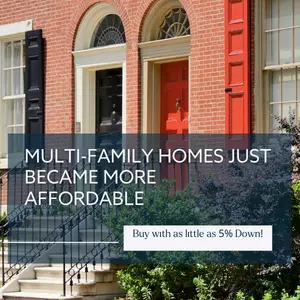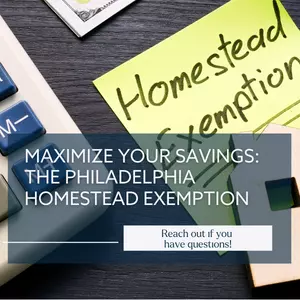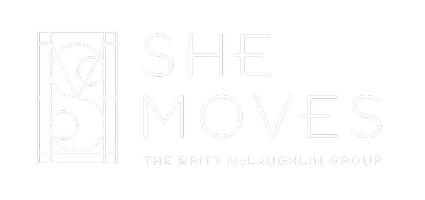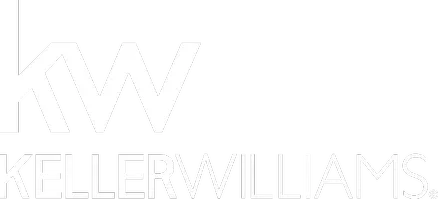
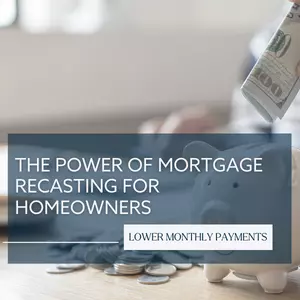
Unlocking Financial Flexibility: The Power of Mortgage Recasting for Homeowners
Owning a home is a significant milestone, and managing your mortgage effectively can make a substantial impact on your financial well-being. One option that often goes underappreciated is mortgage recasting. In this blog post, we'll unravel the mystery behind mortgage recasting and shed light on why it might be a game-changer for homeowners compared to making a lump sum payment.Understanding Mortgage RecastingMortgage recasting is a process that allows homeowners to re-amortize their loan by making a significant lump sum payment towards the principal. Unlike refinancing, which involves getting a new loan with different terms, recasting involves keeping the existing loan but adjusting the monthly payment amount based on the reduced principal balance.The Benefits of Mortgage Recasting1. **Lower Monthly Payments:** - Recasting can lead to a reduction in your monthly mortgage payments. By making a lump sum payment, you effectively lower the remaining balance on your loan, resulting in a recalculated monthly payment. This can be particularly beneficial if you want to ease your monthly budget without the hassle of refinancing.2. **Interest Savings:** - The reduction in the principal balance through recasting means you'll pay less interest over the life of the loan. This can translate to substantial long-term savings, allowing you to keep more money in your pocket.3. **Financial Flexibility:** - Mortgage recasting offers a unique advantage of maintaining the existing loan terms. This means you retain the interest rate, loan duration, and other favorable terms. It provides a middle ground between making extra payments and a full-scale loan refinance, offering financial flexibility without the complexities of a new loan agreement.4. **No Credit Impact:** - Unlike refinancing, mortgage recasting doesn't affect your credit score. It's a behind-the-scenes adjustment that doesn't involve credit checks or extensive paperwork. This is a valuable aspect for those looking to improve their financial situation without the potential drawbacks of refinancing.Recast vs. Lump Sum PaymentWhile making a lump sum payment towards your mortgage can also reduce the principal balance, it may not have the same impact on monthly payments as recasting. A lump sum payment might shorten the loan term but may not result in an immediate reduction in monthly payments. Mortgage recasting provides a more balanced approach, allowing homeowners to enjoy both lower monthly payments and long-term interest savings.Mortgage recasting is a powerful tool for homeowners seeking financial flexibility and reduced mortgage obligations. It offers the benefits of lower monthly payments, interest savings, and financial freedom without the complexities associated with refinancing. If you're considering ways to optimize your mortgage, exploring the option of mortgage recasting could be a strategic move toward achieving your financial goals. Ready to take the next step toward financial freedom through mortgage recasting? Reach out to us, and we'll connect you with our network of trusted lender partners. They'll work closely with you to assess your unique situation, explore the best recasting options, and guide you toward a more manageable and rewarding mortgage experience. At She Move Realty, we believe in empowering homeowners with the knowledge and resources they need to make sound financial decisions. Connect with us today, and let's embark on the journey to optimize your mortgage and secure a brighter financial future.
Read More
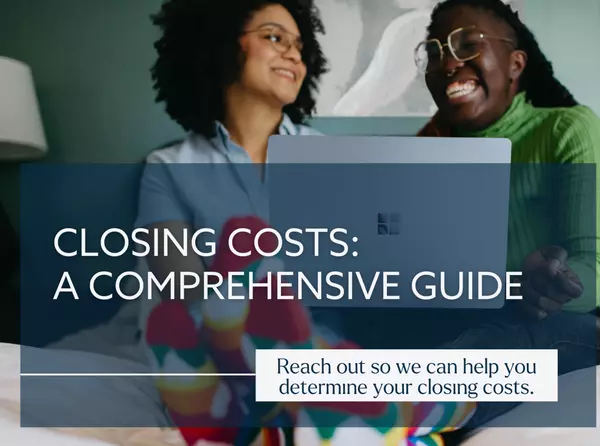
Buyer Closing Costs: A Comprehensive Guide
Buyer Closing Costs: A Comprehensive Guide Closing costs are the fees that you pay when you buy or refinance a home. They can add up to a significant amount of money, so it's important to understand what they are and how much they'll cost you. Common Closing Costs Here is a more comprehensive list of common closing costs: Loan origination fee: This is a fee charged by the lender to process your loan application. It is typically a percentage of the loan amount, and it can vary depending on the lender and the type of loan you get. Appraisal fee: This is the cost of having the property appraised to determine its value. This is required by lenders to make sure that the property is worth the amount of money you are borrowing. Credit report fee: This is the cost of obtaining your credit report. Lenders review your credit report to assess your risk as a borrower. Title insurance: This insurance protects you and the lender against any liens or claims on the property. It is important to have title insurance to make sure that you have clear title to the property. Recording fees: These are fees charged by the government to record the transfer of ownership of the property. The amount of recording fees varies by state. Prepaid expenses: These include things like homeowners insurance, property taxes, and mortgage insurance. You will typically need to pay prepaid expenses for the period of time between closing and the end of the current month. Other Closing Costs In addition to the common closing costs listed above, there may be other costs associated with your home purchase or refinance. These costs can vary depending on your specific situation. Some examples include: Attorney fees: If you hire an attorney to represent you at closing, you will need to pay their fees. Broker fees: Real estate agents and brokers typically charge a commission for their services. This commission is usually paid by the seller, but it is possible that you may need to pay a portion of the commission if you are buying a home without a buyer's agent. Pest inspection fee: If you have a pest inspection done on the property, you will need to pay the fee for the inspection. Survey fee: If you have a survey done on the property, you will need to pay the fee for the survey. Homeowners association (HOA) fees: If the property is located in a community with a homeowners association, you will need to pay HOA fees. How Much Will Closing Costs Cost Me? The amount of closing costs you pay will vary depending on the type of loan you get, the price of the home, and the state where you live. However, you can expect to pay between 2% and 6% of the purchase price of the home in closing costs. How to Reduce Closing Costs There are a few ways to reduce closing costs: Shop around for a lender. Different lenders charge different closing costs, so it's important to compare rates and fees from multiple lenders before you choose one. Ask about discounts. Some lenders offer discounts on closing costs for things like first-time homebuyers, military members, and teachers. Negotiate with the seller. In some cases, you may be able to negotiate with the seller to have them pay some of your closing costs. *ask your agent how?! How to Pay for Closing Costs Closing costs can be paid for in a variety of ways, including: Out of pocket. This is the most common way to pay for closing costs. Finance them. Some lenders allow you to finance your closing costs into your mortgage. This can be a good option if you don't have the cash on hand to pay for them upfront. Get help from a family member or friend. Some people ask for help from family members or friends to pay for closing costs. Conclusion Closing costs are an important part of buying or refinancing a home. It's important to understand what they are, how much they'll cost you, and how to pay for them. By understanding closing costs, you can avoid any surprises and make sure you're prepared for the financial side of buying a home. Additional Tips for Reducing Closing Costs Consider using a local lender. Local lenders may be more willing to negotiate closing costs than larger, national lenders. Get a pre-approval for a mortgage. This will show sellers that you are a serious buyer and that you are qualified to get a mortgage. This can give you more leverage when negotiating closing costs. Be prepared to walk away. If you are not happy with the closing costs, be prepared to walk away from the deal. There are other homes out there, and you don't want to overpay for a home. Get a good credit score. A good credit score will qualify you for lower interest rates and fees on your mortgage. Make a larger down payment. The larger your down payment, the smaller your loan amount will be, which means you'll pay less in closing costs. Negotiate with the seller. The seller may be willing to pay some of your closing costs, especially if the market is slow. Bundle your closing costs. Some lenders offer discounts if you bundle your closing costs with other services, such as title insurance or homeowners insurance. Ask about closing cost assistance programs. There are a number of government and non-profit organizations that offer programs to help first-time homebuyers and low-income borrowers with closing costs. It's also important to note that some closing costs are fixed, while others can be negotiated. For example, the appraisal fee and the title insurance premium are usually fixed costs. However, you may be able to negotiate the lender's origination fee and the broker's commission. It's always a good idea to compare closing costs from multiple lenders before you choose one. You can also get an estimate of closing costs from your real estate agent. I hope this additional information is helpful. Please let me know if you have any other questions
Read More
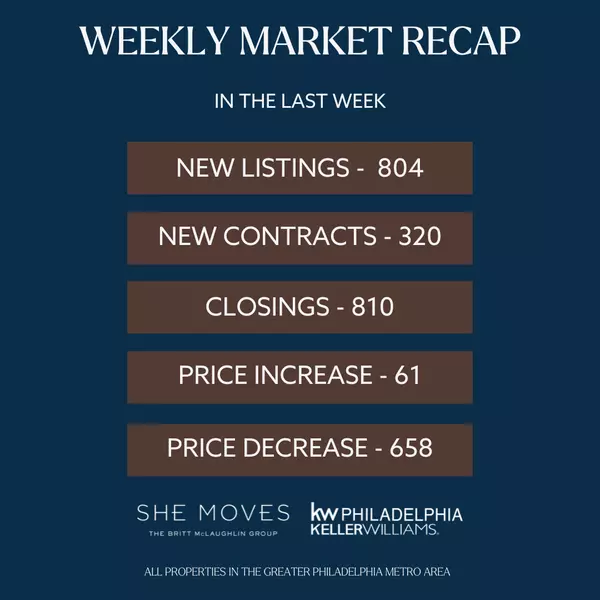
Market Recap October 2, 2023
As of October 2, 2023, the Greater Philly metro area real estate market remains competitive, marked by high demand and limited home supply. In September 2023, the median sales price reached a record $400,000, up 5.7% from a year ago. Key Statistics from the Past 7 Days Median sales price: $400,000 Median days on market: 9 days Sale-to-list price ratio: 97.5% Inventory Levels Inventory levels remain low, with just 9,460 active listings at the end of August 2023. This represents a 14.9% decrease from the same period a year ago. The suburbs are particularly affected by the lack of inventory, with less than 1.5 months of supply. Buyer Demand Despite the competitive market conditions, buyers remain active, particularly in the suburbs. This is likely due to a combination of factors, including relatively affordable prices and a strong job market. However, buyers are facing challenges, such as rising mortgage rates and limited inventory. Market Conditions Overall, the real estate market in the Greater Philly metro area is still a seller's market. Sellers can expect to receive multiple offers on their homes and sell quickly for a good price. Buyers, on the other hand, need to be prepared to act quickly and be flexible with their budget and requirements. Specific trends in key counties:- Bucks County: Median sales price $425,000 (up 5.2%), 3 days on market, and a 100.7% sale-to-list price ratio. Inventory down 16.3%, with strong demand for single-family homes featuring outdoor spaces and amenities.- Montgomery County: Median sales price $500,000 (up 6.1%), 4 days on market, and a 100.6% sale-to-list price ratio. Inventory down 15.2%, mirroring challenges seen in Bucks County.- Delaware County: Median sales price $375,000 (up 5.5%), 3 days on market, and a 100.4% sale-to-list price ratio. Slightly higher inventory, but still down 13.8%. Buyers face competition, especially in desirable areas.Overall, the Greater Philly metro area remains a seller's market, with multiple offers and quick sales expected. Buyers should act swiftly and be flexible. For those buying or selling, partnering with a qualified real estate agent is crucial in navigating this competitive market. Additional Insights Demand is strong for all types of homes, but single-family homes are particularly popular. The most competitive submarkets include Montgomery County, Chester County, and Bucks County. Buyers are increasingly looking for homes with outdoor space and amenities, such as pools and home offices. Sellers are recommended to price their homes competitively and make any necessary repairs or updates before listing. Buyers are advised to work with a qualified real estate agent who can help them navigate the competitive market. Conclusion The Greater Philly metro area real estate market is a complex and ever-changing environment. Buyers and sellers should consult with a qualified real estate agent to develop a personalized strategy for their needs.
Read More
Categories
Recent Posts







